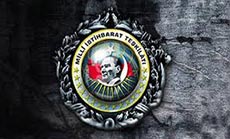
Turkey Seeking to Boost Powers of Secret Service Agency

Local Editor
Turkey's government sought parliamentary approval to boost the powers of the secret service on Thursday, a move seen by Prime Minister Tayyip Erdogan's critics as a bid to tighten his grip on the apparatus of state as he wages a bitter power struggle.
 Control of the NATO member's security apparatus goes to the heart of a feud between Erdogan and Islamic cleric Fethullah Gulen, a former ally based in the United States whose network of followers wields influence in the police and judiciary.
Control of the NATO member's security apparatus goes to the heart of a feud between Erdogan and Islamic cleric Fethullah Gulen, a former ally based in the United States whose network of followers wields influence in the police and judiciary.
Erdogan accuses Gulen's Hizmet network of orchestrating a plot to unseat him, tapping thousands of phones, including his own, over years and using leaked recordings to unleash corruption allegations against his inner circle in the run-up to a series of elections. Gulen denies involvement.
According to an initial draft, seen by Reuters, proposals before parliament include giving the National Intelligence Organization [MIT]more scope for eavesdropping and foreign operations, as well as greater immunity from prosecution for top agents.
The MIT is run by Hakan Fidan, one of Erdogan's closest confidants, who was himself the subject of an inquiry in February 2012 seen by the prime minister's circle as a challenge to his authority from a Gulen-influenced judiciary.
Deputy Prime Minister Besir Atalay said the priority was to update existing laws which were decades out of date and to bring Turkey's spy agency in line with international peers.
"As with Western examples, the aim is to make the legislation more transparent and bestow the agency with a greater range of options," he told parliament.
Erdogan's AK party has a large majority in parliament.
Erdogan's response to the corruption inquiry - purging thousands of officers from the police force and reassigning hundreds of prosecutors and judges - has raised concern in Western capitals, including Brussels, which fears the EU candidate nation is moving further away from European norms.
"Events over the past three months have cast doubt on Turkey's commitment to European values and standards," EU enlargement commissioner Stefan Fuele said, citing tightened control of the judiciary and "massive transfers" of police and prosecutors as part of Erdogan's purging of the bodies.
Erdogan's aides says such criticism underestimates the level of threat to national security from what they describe as a "parallel state" seeking to sabotage his government and thwart his ambition to stand in presidential elections in August.
The latest of the leaked recordings, posted on YouTube days ahead of March 30 local polls which were seen as a referendum on Erdogan's rule, was of a meeting between Fidan, Foreign Minister Ahmet Davutoglu and the deputy head of the armed forces discussing a possible military operation in Syria.
It was by far the most damaging security leak in the months-old scandal and access to YouTube has been blocked since then. The BTK telecoms regulator said on Thursday it would not end the ban despite court rulings that it should do so.
Senior officials have said Turkey will launch a criminal investigation into the alleged "parallel state" backed by Gulen, a crackdown likely to be led by the MIT. Nine police officers were detained in the southern city of Adana on Wednesday in connection with an inquiry into wiretapping, local media said.
The draft bill, which could be amended during debate, seeks to impose strict jail terms for the publication of leaked classified documents and protect the intelligence chief from prosecution by all but the country's highest court of appeal.
"This law is equipping MIT with authorities it should not have in a state of law. These authorities will turn Turkey into an intelligence state," said Sezgin Tanrikulu, a deputy from the main opposition CHP party.
"Under this law, it will become impossible to launch inquiries into all illegal activities conducted by MIT in the past and the future," he told a news conference, citing controversy over the agency's recent alleged role in blocking an investigation into shipments of supplies to Syria.
Source: News Agencies, Edited by website team



